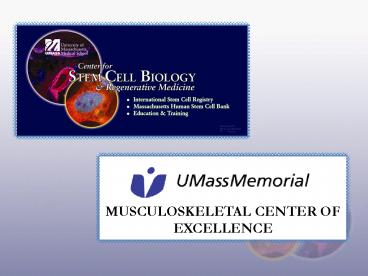STEM CELLS: OPPORTUNITIES AND CHALLENGES - PowerPoint PPT Presentation
1 / 44
Title: STEM CELLS: OPPORTUNITIES AND CHALLENGES
1
(No Transcript)
2
- STEM CELLS OPPORTUNITIES AND CHALLENGES
- Center for Stem Cell Biology Regenerative
Medicine - UMass Memorial Musculoskeletal Center of
Excellence
3
STEM CELLS OPPORTUNITIES AND CHALLENGES
- Biology of stem cells and applications for
treatinghuman disease - UMASS initiatives in developing stem cell-based
therapy
4
STEM CELLS OPPORTUNITIES AND CHALLENGES (Contd)
- Biology of stem cells and applications for
treatinghuman disease - UMASS initiatives in developing stem cell-based
therapy
5
What is a Stem Cell?
- What is a Stem Cell?
- What are different types of stem cells?
- What is the promise of stem cell research?
6
Stem Cells What are they?
7
Development of a Human Embryo
Totipotent
Pluripotent
Lineage Commitment
Single-cell embryo
3-day embryo
5-7day embryo
4-week embryo
6-week embryo
Isolation of Embryonic Stem Cells
8
Properties of Embryonic Stem Cells
Isolated from an early stage embryo
Exhibit normal karyotype
Express Markers
Pluripotent
9
The Promise of Stem Cell Research
10
Why Stem Cells
11
Timeline of Stem Cell Research
1956First successful bone marrow transplant
1998Human embryonic stem cells isolated at Univ.
Wisconsin
1981Embryonicstem cells are isolated from mouse
blastocysts
2007iPS cells first developed
12
Types of Stem Cells
- Adult Stem Cells
- Embryonic Stem Cells (hESC)
- Somatic Cell Nuclear Transfer (SCNT) Stem Cells
- Induced Pluripotent Stem (iPS) Cells
13
Adult Stem Cells
Where have adult stem cells been found?
14
Adult Stem Cells (contd)
15
Lineage Committed Stem Cells Support Bone
Formation (Development and Tissue Regeneration)
OC OP Collagenase
AP BSP Collagen Fra2/JunB
Histone Fibronectin Collagen c-Fos/c-Jun TGFb1 Ost
eopontin
BAX p53 c-Fos Msx2
Matrix Maturation
Lineage Commitment
Proliferation
Mineralization
Self Renewal
Glucocorticoid Vitamin D BMP
BMP TGFb
BMP TGFb
Vitamin D TGFb
Stem Cell
Osteoproginator
Pre-Osteoblast
Osteocyte
16
Embryonic Stem Cells
17
Human Embryonic Stem Cells (hES Cells)
Human ES cell colony on mouse fibroblast feeders
Human Blastocyst
Inner Cell Mass (ICM)
18
hES Cells (contd)
19
Derivation of induced Pluripotent Stem Cells
20
Induced Pluripotent Stem Cells
Reprogramming Correcting Genetic Defect
Reprogramming
21
iPS Cells
22
Comparative Properties of Stem Cells
- Embryonic Stem Cells Indefinite growth
Potential to differentiate into any cell type - Lineage-Specific Stem Cells Limited growth
Potential to differentiate into defined cell
types - Cancer Stem Cells Indefinite growth Cannot
differentiate into a defined cell type
23
Why so many types of stem cells? Because none are
perfect.
24
UMASS Initiatives in Developing Stem
Cell-Based Therapy
- A Collaboration of
- UMASS Center for Stem Cell Biology
Regenerative Medicine - UMASS Memorial Musculoskeletal Center for
Excellence
25
UMASS Contributions to two Rate-LimitingParamete
rs of Stem Cell Control
- Mechanisms that regulate rapid and infinite
proliferation of stem cells - Mechanisms that establish and maintain lineage
commitment following differentiation
26
Genetic and Epigenetic Regulation
- Genetic Control DNA-encoded Regulatory
Information.Epigenetic Control Regulatory
Information for cell structure, function and
specificity NOT encoded in DNA that IS
transmitted to progeny cells during cell
division.
27
Genetic and Epigenetic Regulation
- Genetic Control
28
Genetic and Epigenetic Regulation
- Epigenetic Control
- Histone Code
29
Genetic and Epigenetic Regulation
- Epigenetic Control
- Regulatory Factor Architectural Signature
Transcriptional Suppression
Maximal Expression
30
- Mechanisms that control rapid and infinite
proliferation of stem cells - Mechanisms that establish and maintain lineage
commitment following differentiation
31
The Mammalian Cell Cycle
32
An Abbreviated Cell Cycle in Human Embryonic Stem
Cells
33
Dynamics of Combinatorial Organizationand
Assembly of Regulatory Machinery inNuclear
Microenvironments
34
- Mechanisms that control rapid and infinite
proliferation of stem cells - Mechanisms that establish and maintain lineage
commitment following differentiation
35
Lineage-Specific Retention of RegulatoryMachinery
for Cell Fate DeterminationDuring Mitosis
- Post-mitotic gene expression requires restoration
of nuclear organization and assembly of
regulatory complexes. - Two models
- Degradation, re-synthesis, and assembly/organizat
ion - Retention and partitioning
36
Runx2 A Transcription FactorInvolved in Lineage
Commitment andRequired for Osteogenesis in vivo
37
Contributions of Runx Factors to Genetic and
Epigenetic Control Scaffolds for Spatial
Organization of Promotor Regulatory Complexes
(P/DNA and P/P)
X
Montecino et al (1994) Biochemistry, 33
384 Javed et al (1999) Mol Cell Biol,
197491 Gutierrez et al (2007) J Biol Chem,
282-9445
38
Re-organization of Regulatory MachineryDuring
Mitosis
MITOSIS
INTERPHASE
Young et al (2007) Nature, 445 442
39
Runx2 Remains Stably Associated withMitotic
Chromosomes
Young et al (2007) PNAS, 104 3189
40
Chromosomal Association of Runx2 is Allelic
Runx Foci
Young et al (2007) Nature, 445 442
41
A Multi-Dimensional Approach to Understand Stem
Cell Biology and Therapeutic Potential
- Stem cells exhibit a shorter cell cycle
sustained growth and unrestricted availability. - Cell fate, lineage commitment and maintenance
require the combined contributions of genetic and
epigenetic mechanisms in nuclear
microenvironments during and following cell
division.
42
Challenges and Opportunities of Stem Cell
Research
- Moral and ethical considerations
- Immuno compatibility
- Procedure-related compromises (e.g., insertional
mutagenesis, tumorigenesis) - Retention of genetic basis for diseases
43
Success Stories with Stem Cells
- Bone Marrow Transplantation - Cancer -
Hemotological Diseases - Cardio-vascular Stem Cells
- Neurological Stem Cells - Spinal Cord
Injury - Adult Macular Degeneration - - ALS
- Skeletal Reconstruction
44
Acknowledgements
Members of the UMASS Center for Stem Cell Biology
Regenerative MedicineMembers of the UMASS
Memorial MusculoskeletalCenter of
ExcellenceJanet L. Stein Jane B. Lian Andre van
WijnenKlaus A. Becker Prachi Ghule Matthew
MandelliveDaniel YoungSayyed Kaleem Zaidi































